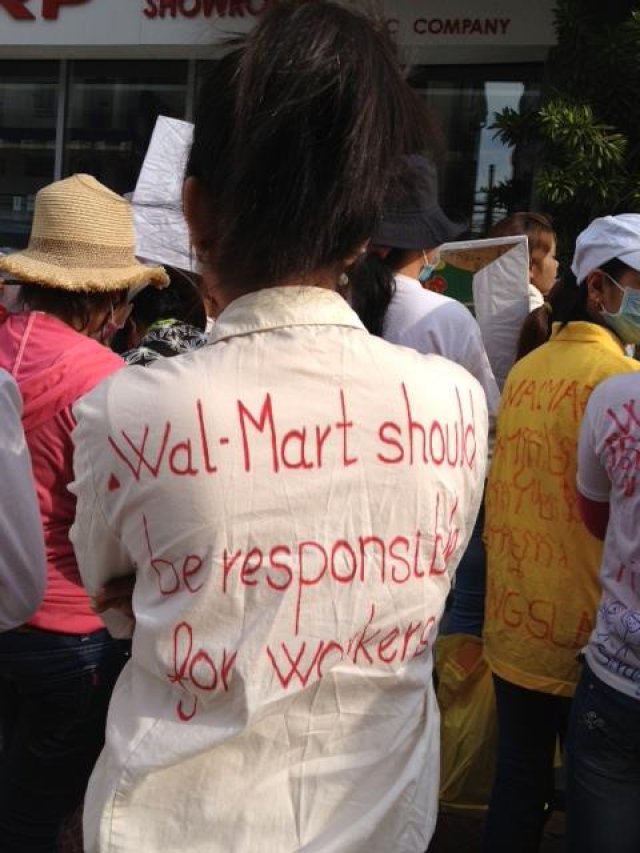
Since mid-January, a group of illegally laid off Cambodian garment workers – mostly women – have been picketing the factory they worked in. Their objective was to stop the company, which closed down owing the workers, collectively, about US$200,000 of unpaid wages, from removing the equipment from the factory.
The protesting workers let some of the factory equipment be sold under the control of Ministry of Labour Vocational Training but they have only been offered US$46 each out the proceeds – if they stop their protest. Outraged at this derisory offer, the workers blocked the road in front of the factory on February 23-24 in a further protest.
Cambodian workers rights activist Sophea Chrek told Green Left Weekly that the workers had also held protests outside the US and Swedish embassies because two of the biggest Western clothing retailers, the US-based Wal-Mart and the Sweden-based H & M, had their products manufactured in the factory operated by Kingsland Garments, a company owned by Hong Kong-based capitalists.
The workers believe that Wal-Mart and H & M have a duty to pay the unpaid wages for their work that these companies have profited from. Wal-Mart's profit in 2012 was US$15.4 billion – a fabulous amount even though it was less than its previous years' record profit of US$15.7 billion. H & M declared a U$2.7 billion profit in 2012.
Low-paid garment workers form the backbone of a growing industry in Cambodia producing clothing to be sold mostly in the US and Europe by big companies like Wal-Mart, H& M, Gap and Levi Strauss. But they operate through subcontractors and thus avoid direct legal obligations to the Cambodian workers.
These garment workers are part of the small minority of Cambodia working formal wages. As the great majority of Cambodians still struggle to get by from subsistence agriculture, these workers are depended upon by their families in the countryside.
“Kingsland employed more than 400 workers, most of them women employed under short, fixed-duration contracts or on no contract at all. They were not given clear information about closing down of the factory,” said Chrek.
The workers were informed that from September 17, 2012 till January 15 work was suspended though they were promised they would continue to be paid half they wages. But the factory owners never honoured this promised, declared bankruptcy and left Cambodia.
“There has been no concrete respond so far from H & M and Wal-Mart. But there has been some communication between them and the workers,” Chrek explained.
One of the garment workers leading the protest is Ms Thy Phalla, aged 28. She has seven siblings. Chrek put a few questions to her and a fellow worker on behalf of Green Left Weekly.
“Usually, I send home US$20-25 a month to my family to support my family. But now, I can no long send home money. Lately, to cope with my daily living, my family send me some rice and some time I have to borrow money from other people.
“I feel bad that I cannot support my family. I feel insecure with my current situation. I have no place to live because I do not have money to pay for a room so I sleep in front of the factory with my workmates.
“Wal-Mart and H & M have a responsibility for us, the workers in Kingsland. We produced for their brands. We face much hardship because the factory closed, so they should respond to us immediately.
“We are only demanding what we are entitled under the labour law.”
Another protesting worker, Mrs Pheng Rotha, 27, has one child, five siblings and a mother to support.
“My family is depending a lot on me. I used to send about US$40-60 a month to my family. Now I feel hopeless. The factory closed suddenly without informing to us. I lost my income so I cannot send my family money to support my mother daily living and my brother's and sisters' education. It is even harder because I am a married woman and I have a child who also needs care.
“The CEOs of Wal-Mart and H & M cannot stay silent! We are in a very hard situation. We need a solution. We demand a fair settlement and respect for our rights under Cambodia's labour laws.”
On February 28, on the eve of a conciliation meeting between workers' representatives, NGOs and government officials, the protesting workers began a hunger strike.

Protesting garment workers occupying street outside the factory in Phnom Penh that owes then unpaid wages. Photo by Ros Sukunthy.

Protesting garment workers outside Swedish embassy Phnom Penh. Photo by Pisey Ly.

Protesting garment workers occupying street outside the factory in Phnom Penh that owes then unpaid wages.. Photo by Vannsopharith Leng.